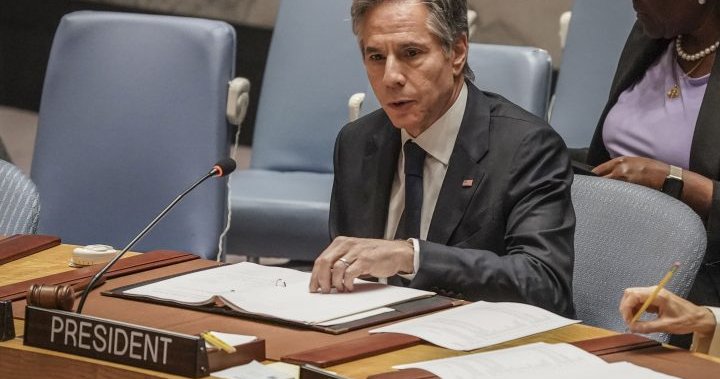U.S. Secretary of State Antony Blinken issued a powerful challenge to all nations, urging them to condemn Russia’s use of the Black Sea and Ukraine’s grain as a form of manipulation and to stop exploiting vulnerable populations in its “unconscionable war.” Speaking at a U.N. Security Council meeting focusing on conflict as a driver of hunger and famine, Blinken condemned Russia’s actions, including bombing granaries and threatening vessels in the Black Sea.
In an effort to address global hunger, Blinken announced that the United States would provide an additional $362 million to tackle hunger in Haiti and 11 African countries. He highlighted the urgent need for funding, noting that the U.N. World Food Program requires $20 billion to assist those in need, but has only received around $5 billion so far this year. This shortfall in funding has already resulted in cuts to food assistance in 38 out of the 86 countries where the program operates.
Blinken also took a veiled swipe at China, emphasizing that the world’s largest economies should be leading in terms of donations to address hunger and famine. He called on all nations to deepen their commitment to fighting hunger.
During the meeting, the Security Council unanimously adopted a statement condemning the use of starvation as a method of warfare and expressing concern about the increasing number of armed conflicts worldwide. Armed conflict has been a significant driver of acute food insecurity for approximately 117 million people in 19 countries and territories in 2022. The statement emphasized the need to break the cycle between conflict and food insecurity.
David Miliband, president of the International Rescue Committee, emphasized the need for action to address the increasing levels of hunger and malnutrition in conflict-affected countries such as Somalia, Afghanistan, Yemen, Nigeria, South Sudan, Sudan, Burkina Faso, Mali, and Haiti. He called for a unified approach to diagnosing and treating malnutrition, as well as the establishment of a single body to coordinate efforts in preventing famine.
Russia’s deputy U.N. ambassador Dmitry Polyansky responded to criticism by claiming that the Black Sea grain deal had become commercial rather than humanitarian. He accused the West of exploiting the topic of hunger to demonize Russia and further their own agenda in Ukraine. Despite this, Polyansky left open the possibility of resuming the agreement if obstacles to the free and safe transportation of Russian grain and fertilizer were removed.
Blinken emphasized that the U.S. wants to see food from all nations on the world markets and for everyone to benefit from lower prices. He stated that if Russia returns to the agreement, the U.S. will ensure that all food and food products can be exported freely and safely, including those from Russia.
Denial of responsibility! VigourTimes is an automatic aggregator of Global media. In each content, the hyperlink to the primary source is specified. All trademarks belong to their rightful owners, and all materials to their authors. For any complaint, please reach us at – [email protected]. We will take necessary action within 24 hours.


